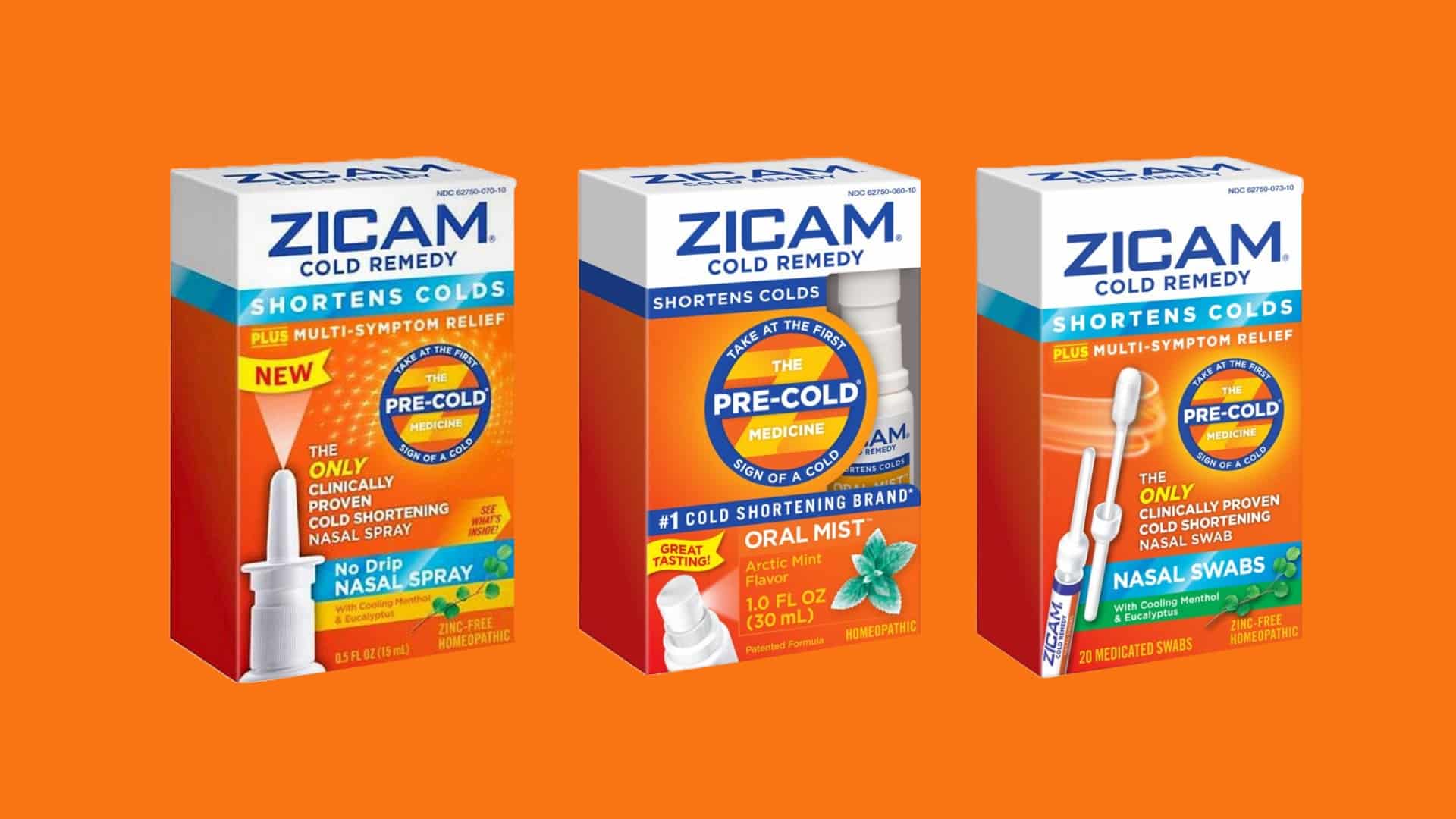Cold and flu symptoms can throw your whole week out of whack: the sore throat, the coughing, the fatigue. In an age of space travel and FaceTime, you’d think we’d be able to cure a measly cold. And yet, here we are, sauntering through the drugstore.
One of the go-to treatments for colds and flus is Zicam. It’s popular, it’s cheap, and it’s everywhere—but does Zicam actually work?
Zicam claims to reduce the duration of the common cold and helps to relieve nasal and sinuses congestion associated with colds, flus, and even allergies. There are a variety of Zicam products, including tablets that melt in the mouth, gummies that you chew, medicated nasal swabs, and “no-drip” nasal sprays.
All of these Zicam products work on the principle of homeopathy or homeopathic remedy. So let’s take a deep dive into what that means, how it works, whether it’s safe, and ultimately: does it make sense to take Zicam?
What is Zicam?
Zicam is a branded suite of products intended to treat cold, flu, and allergy symptoms. The name Zicam is a combination of the words “zinc” and “ICAM-1,” the receptor to which viruses bind to infect cells (more on this later).
Zicam was developed by Charles B. Hensley and Robert Steven Davidson in the mid 1990s. A company, Matrixx Initiatives, Inc., was created to manufacture and sell Zicam products. In 2020, Church & Dwight Co. acquired Matrixx Initiatives and took over all Zicam operations. Today, Zicam creates a plethora of products including lozenges, tablets, drops, gummies, and nasal sprays.
The primary ingredient in all of the oral products is the mineral zinc (specified as zincum aceticum, zincum gluconicum, and zinc gluconate). However, the exact quantity of zinc is only listed in the Zicam gummies via the Supplement Facts panel.
Most of the nasal products (sprays and swabs) rely on plant-based ingredients such as galphimia glauca, luffa operculata, and sabadilla. Sulphur is also utilized in the allergy relief nasal products. The exact quantities of these ingredients are not listed.
Finally, oxymetazoline hydrochloride is a chemical used as a decongestant in the Zicam congestion and sinus relief nasal sprays.
Zicam is as mainstream as medication gets: you can find it at your local drugstore or get it delivered in 24 hours online. But you might be surprised to know Zicam is technically a homeopathic treatment.
Homeopathy is a form of alternative medicine and healing based on the principle of “similia similibus curantur,” or that “like is cured by like.” This principle states that if some substance can cause a sickness it can also be repurposed into healing that sickness. Homeopathic remedies seek to stimulate the body to heal itself and fight off disease.
Homeopathy is regulated by the Food and Drug Administration (FDA) in the United States. But this doesn’t mean that any claims of benefits are endorsed or evaluated by the FDA. Instead, the FDA provides certain product guidelines and ensures that those guidelines are followed.
Although controversial, homeopathy is practiced by millions of people around the world and some even believe that homeopathic principles may have similarities to traditional vaccine mechanisms that led to the eradication of smallpox, polio, and other diseases.
Does Zicam Work to Treat the Cold and Flu?

There’s currently no clinical evidence that Zicam products shorten or prevent the common cold or flu. However, the ingredients in Zicam have been shown to help people recover quicker.
Here’s how: Most colds are caused by rhinoviruses, which bind to the cells in your nasal passage. One way to block these viruses is with zinc ions. A 2017 meta analysis found that zinc lozenges reduced the duration of the common cold by 33%.
These results are promising, but there’s a catch: you need to take Zicam (or another zinc supplement) within 24 hours of your first symptoms to achieve the maximum effect. A 2013 study found that taking zinc lozenges at the onset of the common cold helped patients recover significantly faster compared to a placebo group.
It’s also worth noting that a zinc deficiency, while rare, can increase your risk of getting viral infections. That’s where Zicam comes in. For the 15% of American adults who don’t get enough zinc, Zicam can be a solid insurance policy against catching the cold or flu. But if you’re generally healthy, taking Zicam to ward off illnesses won’t give you a superhuman immune system.
So, the jury’s still out on Zicam’s effectiveness—but what about its safety?
Is Zicam Safe?
Zicam is generally safe for adults and children 12 and older. That said, it should only be taken in moderation—definitely not every day. The most common side effects of Zicam are nausea and a bad aftertaste.
It’s recommended that children and pregnant women should avoid Zicam, since there haven’t been enough studies to ensure it’s safe to use it.
The biggest concern with Zicam came in June 2009 when the brand’s nasal spray was recalled by the US Food and Drug Administration (FDA). That’s because studies found that using zinc in the nasal passage can cause serious or permanent side effects, such as losing your sense of smell. Accordingly, Zicam switched to zinc-free formulations for its nasal sprays.
The Best Time to Treat Colds Is Before You Get Them
It’s tempting to mega-dose vitamins and chug orange juice at the first sign of sniffles. But it can take weeks or even months to correct nutritional deficiencies and build up vitamins in your system.
Accordingly, your best defense against sickness is practicing immune-boosting habits every day, not just when you’re in panic mode. That means getting plenty of sleep, exercising regularly, eating a balanced diet, and (of course) taking your vitamins—you can even get your daily dose of zinc when you brush your teeth or get a boost of zinc every time you freshen you breath.
You might not be able to conquer your cold completely, but healthy habits can make sick days a lot more manageable.
